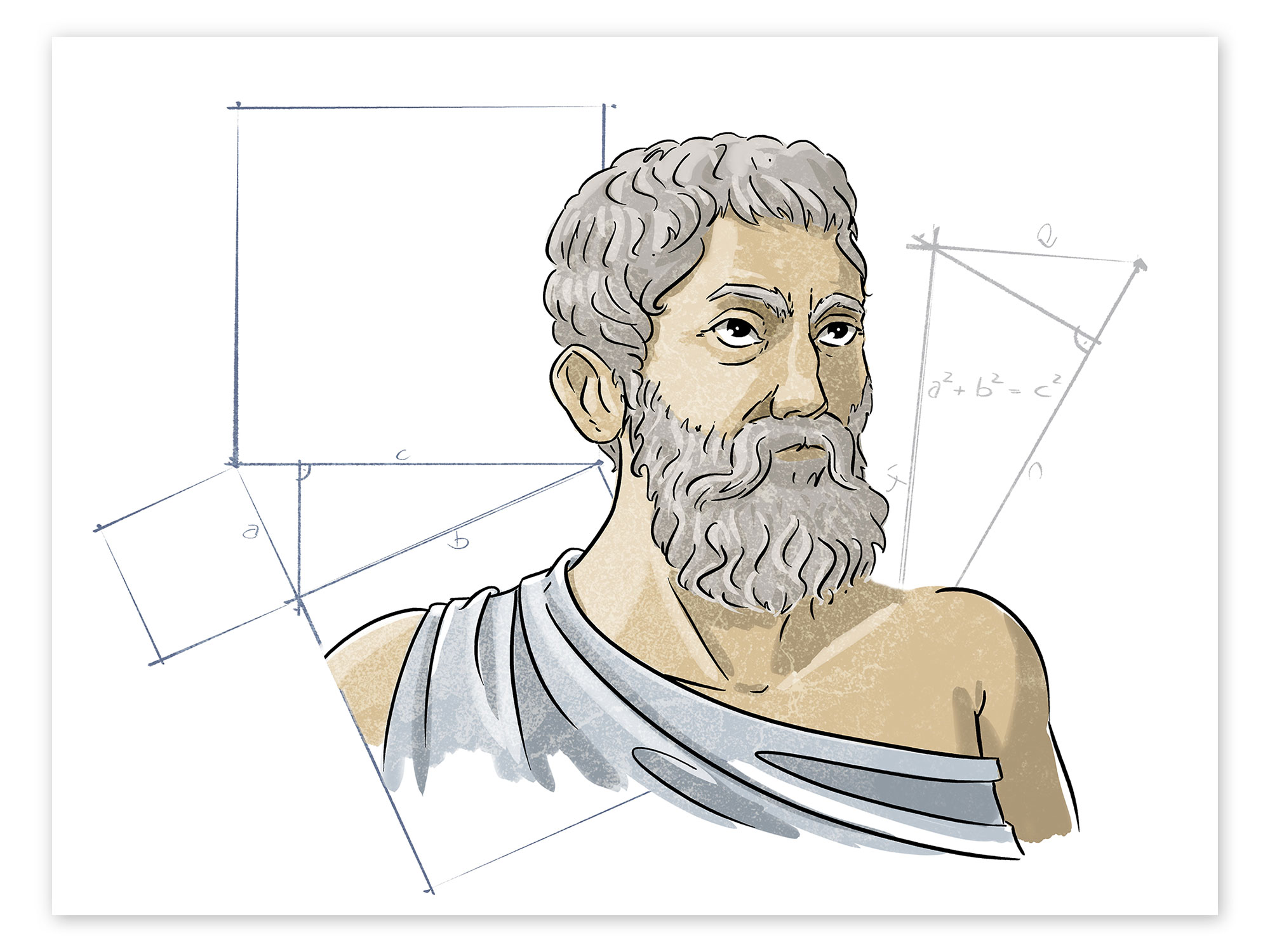The Life and Legacy of Pythagoras: A Mathematical Philosopher
Pythagoras, an ancient Greek philosopher and mathematician, is one of the most influential figures in the history of Western thought. His contributions to mathematics, philosophy, and even music theory have had a profound impact on subsequent generations, shaping the course of intellectual inquiry for centuries to come. In this exploration, we'll delve into the life, teachings, and legacy of Pythagoras, spanning his philosophical doctrines, mathematical discoveries, and cultural influence. Early Life and Education:
Early Life and Education:
Pythagoras was born around 570 BCE on the island of Samos, in the eastern Aegean Sea, which was then part of the Greek world. Little is known about his early life, but it is believed that he received a well-rounded education, likely including mathematics, music, philosophy, and athletics. Some accounts suggest that he traveled widely in his youth, visiting Egypt, Mesopotamia, and possibly India, where he would have encountered various intellectual traditions and religious practices that influenced his later teachings.
The Pythagorean Brotherhood:
Upon returning to Greece, Pythagoras established a philosophical and religious community in the city of Croton, in southern Italy, around 530 BCE. This community, known as the Pythagorean Brotherhood, was based on principles of communal living, intellectual inquiry, and spiritual devotion. Members of the brotherhood, known as Pythagoreans, adhered to a strict code of conduct and participated in philosophical discussions, mathematical investigations, and religious ceremonies.
Philosophical Teachings: Pythagoras' philosophical teachings encompassed a wide range of topics, including metaphysics, ethics, politics, and epistemology. Central to his philosophy was the concept of harmony, which he believed permeated the cosmos and could be understood through mathematics and music. Pythagoras taught that the universe was ordered according to mathematical principles, and that the study of mathematics was essential for gaining insight into the nature of reality.
Pythagoras' philosophical teachings encompassed a wide range of topics, including metaphysics, ethics, politics, and epistemology. Central to his philosophy was the concept of harmony, which he believed permeated the cosmos and could be understood through mathematics and music. Pythagoras taught that the universe was ordered according to mathematical principles, and that the study of mathematics was essential for gaining insight into the nature of reality.
Mathematical Discoveries:
Pythagoras is best known for the Pythagorean theorem, a fundamental result in geometry that bears his name. According to legend, Pythagoras discovered the theorem while studying the properties of right-angled triangles. The theorem states that in a right-angled triangle, the square of the length of the hypotenuse (the side opposite the right angle) is equal to the sum of the squares of the lengths of the other two sides. This theorem has numerous applications in geometry, trigonometry, and engineering, and it remains one of the most important results in mathematics.
Music and Cosmology:In addition to his mathematical achievements, Pythagoras made significant contributions to the study of music and cosmology. He is credited with discovering the mathematical relationship between the lengths of vibrating strings and the musical intervals they produce, known as the harmonic series. Pythagoras believed that this harmony reflected the underlying structure of the universe and that music had the power to influence human emotions and behavior. He also developed a cosmological model based on the idea of a "harmony of the spheres," in which the movements of the celestial bodies produced a celestial music that could be perceived by the soul.
Legacy and Influence:
Pythagoras' teachings had a profound influence on subsequent generations of philosophers, mathematicians, and scientists. His emphasis on the importance of mathematics and the pursuit of truth laid the groundwork for the development of Western science and philosophy. The Pythagorean theorem became a cornerstone of Euclidean geometry and remains a fundamental result in mathematics to this day. Pythagoras' ideas also influenced the development of Platonic philosophy, Neoplatonism, and Renaissance humanism, shaping the intellectual landscape of Western civilization for centuries.
Euclidean geometry and remains a fundamental result in mathematics to this day. Pythagoras' ideas also influenced the development of Platonic philosophy, Neoplatonism, and Renaissance humanism, shaping the intellectual landscape of Western civilization for centuries.
Pythagoras was a towering figure in the history of Western thought, whose contributions to mathematics, philosophy, and music continue to resonate today. His philosophical doctrines, mathematical discoveries, and cultural influence have left an indelible mark on the intellectual and spiritual traditions of the Western world, embodying the timeless quest for knowledge, harmony, and truth
The Pythagorean Way of Life:
The Pythagorean Brotherhood was not merely an intellectual community but also a way of life guided by principles of moderation, self-discipline, and ethical conduct. Pythagoras advocated vegetarianism, abstinence from alcohol, and a simple lifestyle free from excess. He believed in the importance of cultivating virtues such as wisdom, courage, and justice, and encouraged his followers to strive for moral excellence in all aspects of their lives. The Pythagorean way of life emphasized the harmony of the body, mind, and soul, and sought to achieve a balance between physical, intellectual, and spiritual pursuits. Pythagoreanism and Religion:
Pythagoreanism and Religion:
Pythagoras' teachings had a profound influence on ancient Greek religion and spirituality. The Pythagoreans believed in the immortality of the soul and the idea of reincarnation, which they viewed as a process of purification and spiritual evolution. They practiced various rituals and ceremonies, including the worship of the gods, communal meals, and secret initiations. Pythagoras himself was revered as a semi-divine figure, and his teachings were regarded as sacred wisdom passed down from the gods.
Pythagoreanism and Mathematics:
Pythagoras' contributions to mathematics extended beyond the discovery of the Pythagorean theorem. He made significant advances in geometry, arithmetic, and number theory, laying the foundation for later developments in mathematics. The Pythagoreans studied the properties of numbers and geometric figures, exploring topics such as proportion, symmetry, and irrationality. They also made important contributions to the theory of music and the concept of mathematical beauty, seeing mathematics as a divine art that revealed the order and harmony of the cosmos.
Pythagoreanism in the Hellenistic Period: After Pythagoras' death, his teachings continued to spread throughout the ancient world, influencing various philosophical schools and religious movements. Pythagoreanism flourished in the Hellenistic period, particularly in the city of Alexandria, where it became closely associated with Neoplatonism and Hermeticism. Pythagorean ideas were incorporated into the philosophical systems of Plato, Aristotle, and other ancient thinkers, shaping the intellectual landscape of the Mediterranean world.
After Pythagoras' death, his teachings continued to spread throughout the ancient world, influencing various philosophical schools and religious movements. Pythagoreanism flourished in the Hellenistic period, particularly in the city of Alexandria, where it became closely associated with Neoplatonism and Hermeticism. Pythagorean ideas were incorporated into the philosophical systems of Plato, Aristotle, and other ancient thinkers, shaping the intellectual landscape of the Mediterranean world.
Pythagoreanism in the Middle Ages and Renaissance:
Pythagoreanism experienced a revival during the Middle Ages and Renaissance, as scholars rediscovered and reinterpreted ancient texts and ideas. Pythagoras' mathematical discoveries and cosmological theories inspired Renaissance thinkers such as Leonardo da Vinci, Johannes Kepler, and Galileo Galilei, who sought to understand the order and harmony of the natural world through mathematical inquiry. Pythagorean symbolism and imagery also permeated Renaissance art, literature, and architecture, reflecting a renewed interest in ancient wisdom and esoteric knowledge.
Pythagoreanism in Modern Times::max_bytes(150000):strip_icc()/GettyImages-92832756-2f50d3a4cbdb4faaac4a22dc5930d001.jpg) Pythagoreanism continues to exert a fascination in modern times, as scholars explore its connections to contemporary scientific, philosophical, and spiritual movements. The Pythagorean theorem remains a fundamental concept in mathematics education, taught to students around the world as an example of mathematical reasoning and proof. Pythagorean ideas about the unity of the cosmos, the harmony of the spheres, and the interconnectedness of all things resonate with modern theories in physics, cosmology, and ecology, reflecting a timeless quest for understanding the mysteries of the universe.
Pythagoreanism continues to exert a fascination in modern times, as scholars explore its connections to contemporary scientific, philosophical, and spiritual movements. The Pythagorean theorem remains a fundamental concept in mathematics education, taught to students around the world as an example of mathematical reasoning and proof. Pythagorean ideas about the unity of the cosmos, the harmony of the spheres, and the interconnectedness of all things resonate with modern theories in physics, cosmology, and ecology, reflecting a timeless quest for understanding the mysteries of the universe.
In summary, Pythagoras was not only a mathematician and philosopher but also a visionary thinker whose ideas transcended the boundaries of time and culture. His teachings on mathematics, philosophy, and spirituality continue to inspire and influence generations of scholars, artists, and seekers of wisdom, embodying the enduring quest for truth, beauty, and harmony in the human experience.



































































